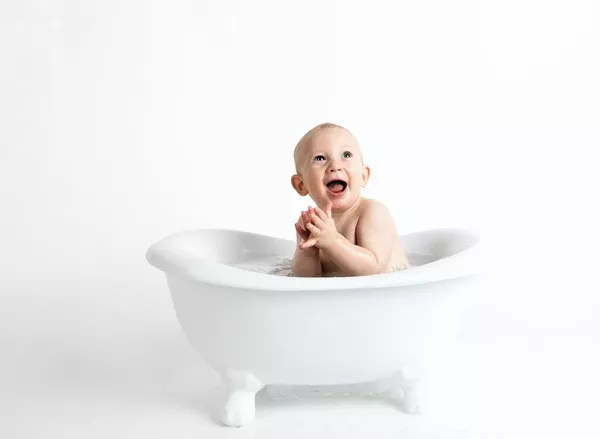Bringing a newborn baby into the world is an incredible experience filled with joy, wonder, and a whole new set of responsibilities. As parents, we strive to provide the best care possible for our little ones, ensuring their health and well-being. One aspect of newborn care that often raises questions is bathing. How often should a newborn be bathed? Should it be a daily ritual or a less frequent occurrence? In this article, we will explore the factors to consider when deciding on the frequency of newborn baths, debunk common myths, and provide practical guidelines for maintaining proper hygiene.
Understanding Newborn Skin
Before delving into the topic, it’s crucial to understand the unique characteristics of newborn skin. A baby’s skin is significantly different from adult skin in terms of structure, sensitivity, and function. It is delicate, thin, and highly permeable, making it more susceptible to dryness, irritation, and infection. The top layer of a newborn’s skin, known as the stratum corneum, is not fully developed, making it more prone to moisture loss and potential damage.
Factors to Consider
Vernix Caseosa: A protective coating called vernix caseosa covers a newborn’s skin at birth. This waxy substance serves as a natural moisturizer and barrier, helping to maintain the baby’s skin hydration and protect against infection. It is advisable to leave this vernix on the skin for a certain period before gently wiping it off, as it offers numerous benefits.
Climate and Season: Environmental factors, such as humidity levels and temperature, play a significant role in determining how often a newborn should be bathed. In hot and humid climates, more frequent baths may be necessary to prevent sweat and grime buildup. Conversely, in colder climates or during the winter season, frequent bathing may lead to excessive dryness and discomfort for the baby.
Baby’s Activity Level: Newborns are not particularly active, as they spend most of their time sleeping, eating, and being cuddled. If your baby isn’t exposed to excessive dirt or bodily fluids, daily baths might not be necessary.
Skin Sensitivity: Some babies have more sensitive skin than others, which may require adjustments in the bathing routine. If your baby exhibits signs of skin irritation, dryness, or rashes, it may be beneficial to reduce the frequency of baths and use gentle, hypoallergenic products.
Benefits of Regular Bathing
While daily baths may not be necessary for every newborn, regular bathing offers several advantages:
Hygiene: Bathing helps to keep the baby’s body clean, removing dirt, bacteria, and residual substances such as formula or breast milk that may accumulate on the skin.
Relaxation and Bonding: Bath time can be a soothing and enjoyable experience for both parents and newborns. It provides an opportunity for bonding and sensory stimulation, helping the baby feel secure and loved.
Stimulation of Development: Bathing can contribute to the development of a baby’s motor skills, as they learn to kick, splash, and grasp objects in the water.
Sleep Promotion: A warm bath before bedtime can aid in relaxation, potentially leading to improved sleep patterns for the baby.
Practical Guidelines for Newborn Bathing
Now that we understand the factors to consider and the benefits of regular bathing, let’s outline some practical guidelines:
Frequency: For most newborns, a bath two to three times a week is sufficient to maintain cleanliness and skin health. On the remaining days, you can opt for a gentle sponge bath, focusing on the diaper area, face, and skin folds.
Water Temperature: The water used for bathing should be comfortably warm, around 37-38°C (98-100°F). Use a reliable bath thermometer or test the water with your elbow or wrist to ensure it’s not too hot or too cold.
Duration: Keep the bathing sessions short, usually around 5-10 minutes, to prevent overexposure to water and minimize the risk of drying out the baby’s skin.
Gentle Cleansing: Use a mild, fragrance-free baby cleanser specifically formulated for newborns. Avoid harsh soaps, shampoos, or cleansing agents that can strip away the natural oils and disrupt the baby’s skin barrier.
Moisturization: After bath time, gently pat your baby’s skin dry with a soft towel and apply a hypoallergenic, fragrance-free moisturizer to help retain moisture and prevent dryness.
Safety: Never leave your baby unattended in the bath, even for a moment. Ensure all necessary bathing supplies, such as towels, cleansers, and diapers, are within arm’s reach to prevent accidents.
Conclusion
Bathing a newborn baby is an important aspect of their care routine, ensuring hygiene and skin health. However, the frequency of baths should be determined based on various factors, such as climate, skin sensitivity, and overall cleanliness. Remember, every baby is unique, and what works for one may not work for another. By understanding the needs of your baby’s delicate skin and following practical guidelines, you can establish a bathing routine that maintains their well-being while providing a positive bonding experience for both of you.


